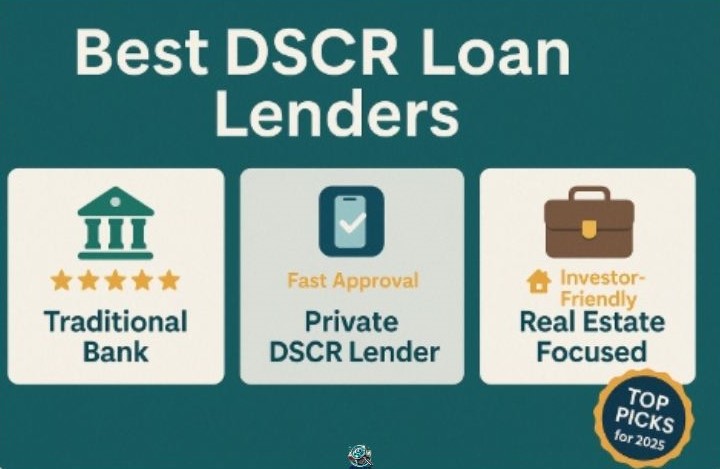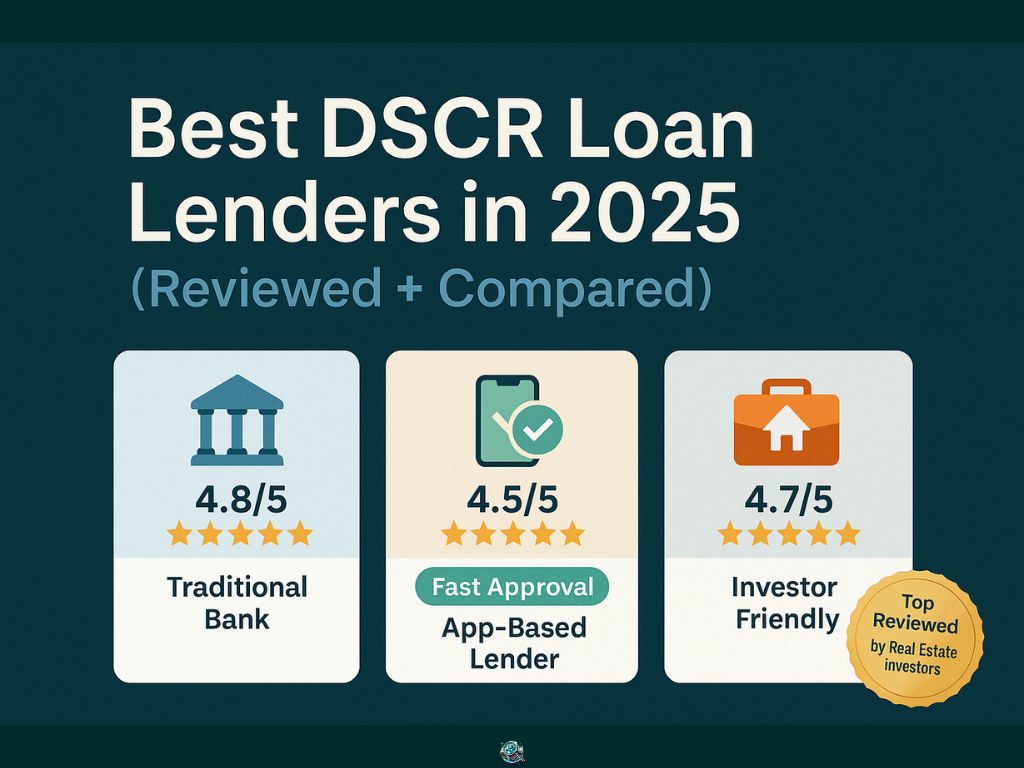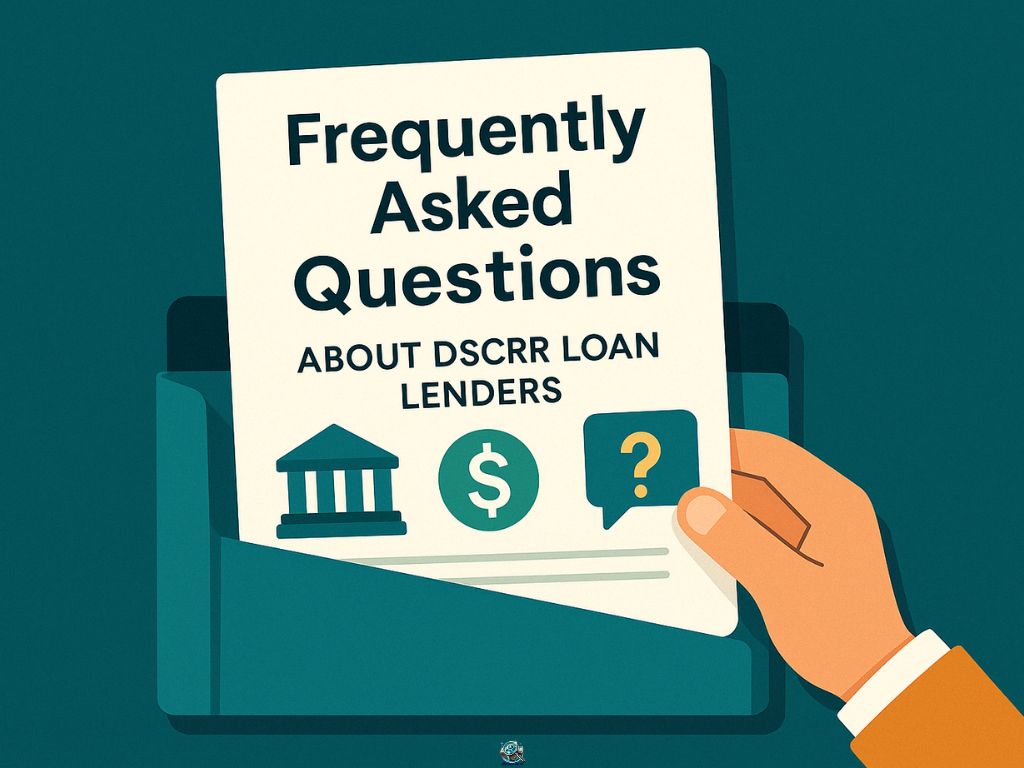Introduction
Finding a DSCR loan is easy. Finding a lender who actually understands real estate investors? That’s the hard part.
Too many lenders slap “DSCR” on their marketing and then act like a traditional bank behind the scenes slow approvals, rigid underwriting, and zero clue how investors operate. That’s not a partnership. That’s a bottleneck.
The right DSCR lender doesn’t just give you money. They unlock deals. Move fast. Bend where it counts. And help you scale without making you explain your entire life story.
In this guide, we’re not just listing names we’re breaking down who’s worth working with, who’s not, and what separates a true investor-friendly lender from a paper-pusher with a marketing budget.
The best DSCR loan lenders for investors in 2025 share one defining quality: they think like investors, not institutions.
Key Takeaways
What To Know
- Most DSCR lenders market to investors — but only a few are actually built to serve them.
- A fast yes from the wrong lender can still wreck your deal.
- The best lenders know the game: fast closings, investor-first underwriting, no W-2 obsession.
- This guide shows you which lenders stand out and which ones quietly kill momentum.
- You’ll walk away knowing who to trust, who to avoid, and how to choose a lender that moves at investor speed.
Disclaimer: This site contains affiliate links. If you make a purchase, we may earn a commission at no extra cost to you.

What Makes a Great DSCR Loan Lender?
Most lenders say they offer DSCR loans.
But if they treat your investment deal like a consumer mortgage application, it’s game over before you start.
A great DSCR lender doesn’t just check boxes they understand investors. They underwrite deals the way you analyze them: by the numbers, by the yield, and by the exit.
Here’s what separates a true investor-focused lender from one simply using “DSCR” as a buzzword:
Fast, Investor-Friendly Underwriting
You’re not applying for a job; you’re trying to close a deal.
Top lenders know time kills opportunities. Their underwriting process prioritizes deal performance over personal paperwork. They move fast, request only what’s essential, and know how to evaluate cash flow rather than tax returns.
A solid DSCR lender can issue term sheets within days and close in weeks not months because they’ve built their operations for investors, not first-time homebuyers.
Clear DSCR Requirements
The best lenders make it simple to qualify. They’ll tell you upfront their DSCR minimum (often 1.0 – 1.25), which property types they accept, and how they calculate rental income whether it’s long-term lease or short-term rental data.
When you know those rules early, you can structure deals with confidence and avoid surprises halfway through underwriting.
Transparency at this stage saves both time and leverage.
Flexible Loan Structures
There’s no one-size-fits-all investment loan.
A great DSCR lender offers options: fixed or ARM, interest-only periods, 30-year amortizations, and support for entity-based ownership. They understand that your goals differ depending on your holding strategy whether you’re cash-flowing a short-term rental or flipping after stabilization.
Flexibility is how investors scale; rigidity is how they stall.
Transparent Terms and Fees
Hidden fees, vague reserves, and fine-print penalties are signs of an outdated lending culture.
Investor-first lenders give you full visibility: interest rate, origination, prepayment terms, reserve requirements, and closing costs before you commit. You should never have to chase numbers down after sending your documents.
Support for Self-Employed & Portfolio Investors
If a lender struggles to understand multiple LLCs, layered income streams, or STR data they’re not a true DSCR partner.
Top lenders know how entrepreneurs operate. They simplify verification for repeat borrowers, value proven track records, and design programs that reward scale.
That’s what separates a transactional lender from a strategic one.
Based on 2025 lender disclosures and industry data, top-performing DSCR lenders typically maintain closing times between 10 – 21 days, support entity-based lending across most states, and offer flexible DSCR thresholds starting near 1.0x coverage for experienced investors.

Best DSCR Loan Lenders in 2025 (Reviewed + Compared)
Not every lender offering DSCR loans is built to serve real estate investors.
Some understand how investors think; fast closings, predictable processes, flexible structures. Others treat every file like a residential mortgage, asking for pay stubs, tax returns, and explanations that waste time and kill deals.
In 2025, the best DSCR loan lenders share a few defining traits: they’re transparent, they move at investor speed, and they actually understand the business model behind your properties.
Below are the lenders that consistently deliver for investors not just in marketing, but in how they fund, communicate, and close.
Kiavi
What sets them apart: Kiavi is built for speed and scale. Their platform was designed specifically for real estate investors, offering an application-to-closing process that’s largely automated yet still supported by real humans when it counts.
They’re one of the few lenders that can take a complete rental loan from term sheet to closing in as little as 10–15 days all without drowning you in documentation.
Their tech-first approach makes repeat financing efficient, which is why they’ve become a go-to for fix-and-hold investors across the country.
Where they deliver:
- Reliable closings in 10–15 days on standard rentals
- Transparent digital process with clear fee visibility
- Consistent national availability and fast communication
- Streamlined refi options for investors scaling portfolios
Consider before applying: Kiavi’s systems are optimized for predictable, mid-sized rental properties. If your deal involves complex ownership structures, mixed-use buildings, or creative financing, flexibility may be limited.
Best for: Investors who value automation, consistent service, and quick turnarounds over full customization.
Visio Lending
What sets them apart: Visio is one of the few DSCR lenders that truly builds around investors not institutions. Their programs accept LLC ownership, short-term rental income, and zero personal income verification. In other words, they underwrite the property’s cash flow, not your personal tax returns.
This makes them an ideal partner for investors building portfolios through entities or scaling short-term rental assets like Airbnb and VRBO units.
Where they deliver:
- Accepts verified STR income for DSCR qualification
- Zero W-2s, tax returns, or pay stubs required
- Flexible loan programs: 30-year fixed, interest-only, and cash-out refi
- Responsive investor-focused support team
Consider before applying: Rates may be slightly higher than competitors, and underwriting can be strict on appraisals and property condition, they want clean, well-performing assets.
Best for: Investors managing LLC-owned properties or short-term rentals who need a lender that respects flexibility and speed over red tape.
Lima One Capital
What sets them apart: Lima One is the bridge between institutional stability and investor agility. They offer a full menu of DSCR products, including SFRs, multifamily, and even new construction loans making them ideal for portfolio builders and strategic investors planning multiple projects.
Their programs are structured, consistent, and available nationwide, with clear guidelines and professional-level underwriting standards.
Where they deliver:
- Broad loan offerings for SFR, multifamily, and construction
- Reliable nationwide footprint, including secondary markets
- Consistent underwriting with strong borrower communication
- Portfolio-level solutions for experienced investors
Consider before applying: Lima One is not the fastest; their focus is structure and reliability. Expect slightly longer timelines and potentially higher reserve requirements, especially for newer borrowers.
Best for: Experienced investors who value predictability, strong support, and scalable financing over ultra-fast closings.
🔎 Summary: Finding Your Fit
Each of these DSCR lenders serves a different type of investor, and understanding that fit is more important than chasing the lowest rate.
| Your Goal | Lender Fit |
|---|---|
| You move fast and keep deals simple | Kiavi |
| You’re scaling with LLCs or STRs | Visio Lending |
| You’re building a portfolio with structure and strategy | Lima One Capital |
Insight: Choose based on strategy, not headline rate. The right DSCR partner aligns with how you buy, build, and exit not how they market themselves.

📊 Quick Comparison: Top DSCR Loan Lenders (2025)
Use the chart below to compare DSCR loan programs side by side and see how each lender approaches speed, flexibility, and borrower profile.
| Lender | Best For | Typical Closing Speed | Loan Types |
|---|---|---|---|
| Kiavi | Fast closings, simple rental deals | 10–15 days | Rental DSCR loans, small multifamily |
| Visio Lending | LLC investors, short-term rentals | ~3 weeks | 30-year fixed, interest-only, cash-out refi |
| Lima One Capital | Portfolio growth, multifamily, new builds | 3–4 weeks | SFR, multifamily, construction |
Based on 2025 lender data and verified investor reports, top-performing DSCR lenders maintain average loan closing times between 10–28 days and typically require a minimum DSCR ratio of 1.0–1.25, depending on property type and borrower experience.

What to Watch Out For When Choosing a DSCR Loan Lender
Most DSCR lenders won’t reject your deal outright; they’ll kill it slowly.
Not with a “no,” but with the kind of inefficiency, unclear terms, or last-minute document requests that cost you weeks and potentially your contract.
Spotting those red flags early isn’t paranoia, it’s protection. The right lender removes friction. The wrong one adds it in small, expensive ways.
Here’s what experienced investors know to look out for:
1. Inconsistent Underwriting Standards
A lender who claims “no income verification” but suddenly asks for W-2s or tax returns halfway through? That’s a time bomb.
This happens when lenders copy DSCR language but still follow consumer-lending logic behind the scenes. Real DSCR programs should qualify deals by the property’s debt service coverage ratio (DSCR), not your personal income history.
Watch for: vague DSCR minimums, unclear rent calculation methods, or changing documentation requirements mid-process.
Investor tip: Ask for their DSCR calculation formula and required coverage upfront 1.0 to 1.25 is typical, depending on lender risk tolerance.
2. Slow Processing and Missed Deadlines
Speed is leverage in real estate. Every day lost waiting for an appraisal or term sheet can mean losing your deal to someone else.
Lenders that take a week just to issue terms often signal deeper operational inefficiency. True investor lenders move with urgency, not bureaucracy.
Watch for: lenders that can’t commit to an average closing timeline.
Investor tip: Ask them to define their “standard processing window.” The best close in 10–21 days, not 45.
3. Hidden Fees and Unclear Pricing
Origination fees, admin fees, rate buydowns, reserves some lenders bury costs in the fine print or disclose them late in the process.
A transparent DSCR lender will outline all fees before application: rate, origination, prepayment penalties, and required reserves. Anything less is a warning.
Watch for: non-refundable application fees or “rate lock” fees that don’t guarantee approval.
Investor tip: Always ask for a written fee sheet before signing a term sheet.
4. Limited Flexibility on Property Types or Ownership
Some lenders love saying “we work with investors” until you mention short-term rentals, mixed-use properties, or out-of-state LLC ownership.
This rigidity can block your deal even when the numbers make sense. True DSCR lenders understand STRs, BRRRRs, and cross-state portfolio growth.
Watch for: lenders who exclude STR income, non-owner entities, or 2–4 unit properties.
Investor tip: Confirm property and entity eligibility upfront, it’s the easiest way to avoid wasted time.
5. Poor Communication and Unclear Expectations
The best lenders answer fast and clearly. The worst make you chase updates and wait days for simple clarifications.
Slow communication early on often predicts what the closing experience will be like. You need a partner who moves as fast as your deals, not one who slows them down.
Watch for: vague answers or delayed responses in the first week.
Investor tip: Test their responsiveness before you apply. Ask 2–3 detailed questions about DSCR structure and see how they reply.

🚩 Red Flags to Watch For (Quick Reference)
| Red Flag | Why It Matters | Investor Tip |
|---|---|---|
| Inconsistent underwriting | Delays or surprise documentation requests | Ask for DSCR minimum and document list upfront |
| Slow processing | Missed deal deadlines | Confirm average closing time in advance |
| Hidden fees | Higher total loan cost | Request a written fee breakdown |
| Lack of flexibility | May reject LLCs or STRs | Verify property and ownership type early |
| Poor communication | Slows deals, increases risk | Test lender responsiveness pre-application |
According to 2025 investor lending benchmarks, the most reliable DSCR lenders disclose full fee sheets and DSCR criteria within 48 hours of inquiry and maintain average response times under 24 hours during underwriting. Consistency, not just speed, remains the strongest predictor of successful closings.

How to Choose the Right DSCR Loan Lender for Your Deal
There’s no single “best” DSCR lender, only the one that fits your deal, your strategy, and your timeline.
A lender that’s perfect for a buy-and-hold investor in Texas might be a nightmare for a short-term rental operator in Florida. The difference isn’t just in the rates; it’s in how each lender structures, underwrites, and communicates.
Choosing right isn’t about chasing the lowest interest rate, it’s about picking the partner that helps you close faster, scale smarter, and avoid friction when deals are moving fast.
Here’s how experienced investors make the right call:
1. Match the Lender to Your Deal Type
Every lender has a comfort zone and your success depends on knowing it.
Some thrive on straightforward long-term rentals. Others specialize in short-term rentals, multifamily units, or unique properties. When your deal falls within a lender’s “sweet spot,” approvals come faster, rates are cleaner, and conditions are lighter.
Example: A lender optimized for SFRs might stumble on a 4-unit Airbnb portfolio. But one experienced in STR income could underwrite it confidently using proven revenue data.
Investor Tip: Before applying, ask: “Do you regularly close this type of deal?” A good DSCR lender will know their niche and say so plainly.
2. Ask the Right Questions Before You Apply
Before sending documents, test how the lender communicates. Their answers will tell you everything you need to know about their process.
Ask these five essentials:
- What’s your minimum DSCR ratio, and how do you calculate it?
- Do you count short-term rental income or only long-term leases?
- Do you lend to LLCs or only to individuals?
- What’s your average closing timeline?
- What are your prepayment penalties and reserve requirements?
You’re not just collecting answers, you’re evaluating clarity, tone, and consistency. A lender who hesitates now will stall later.
3. Look Beyond the Rate Sheet
A low rate can hide a long process, padded fees, or rigid underwriting that kills flexibility when you need it most.
DSCR loans aren’t just about borrowing cost; they’re about deal velocity. A 0.25% higher rate with faster closings and fewer roadblocks can save you thousands in opportunity cost.
Investor Tip: Always compare total time-to-close and conditions-to-close not just the quoted APR.
4. Evaluate Relationship Potential
The best DSCR lenders don’t want one deal; they want your next ten.
You can tell by how they treat you during the first call. Do they ask about your long-term strategy? Do they assign a dedicated account manager? Do they proactively discuss future portfolio lending?
If they treat you like a partner, not a transaction, you’ve found leverage.
What to look for:
- Consistent point of contact
- Access to portfolio or repeat borrower programs
- Willingness to negotiate as volume grows
Partnership-minded lenders make scaling smoother and in real estate, that consistency compounds.
5. Weigh Experience vs. Flexibility
Newer DSCR lenders may offer speed and tech-driven efficiency, but they sometimes lack the flexibility or human nuance that complex deals require.
Established lenders bring structure, but occasionally move slower.
The balance depends on your comfort zone: do you need lightning-fast approvals, or the certainty of institutional reliability?
Investor Tip: If you’re closing your first few DSCR loans, start with a lender that emphasizes support and clarity. Once you’ve built a track record, leverage faster programs designed for volume investors.
Quick Insights
Choosing a DSCR lender isn’t about perfection; it’s about alignment.
You need a lender who matches your speed, your strategy, and your tolerance for complexity. Rates change, execution doesn’t.
The best lender for you will:
- Understand your deal type and entity structure
- Communicate clearly and consistently
- Deliver on timing without surprises
- Treat you like a partner, not paperwork
According to 2025 DSCR lending benchmarks, investors who maintain ongoing relationships with dedicated lender reps report 32% faster closings and 20% higher portfolio growth compared to borrowers who shop each loan individually. Long-term lender alignment directly impacts deal velocity and repeat approval rates.

Final Thoughts: The DSCR Loan Lender You Choose Can Make or Break the Deal
A DSCR loan is only as powerful as the lender standing behind it.
It’s easy to focus on interest rates, terms, or loan-to-value ratios but none of that matters if your lender can’t deliver when timing, structure, or flexibility are on the line. In this space, speed and communication aren’t luxuries; they’re leverage.
The difference between a deal that closes and a deal that collapses often comes down to a lender’s mindset. The wrong one will treat your file like a residential mortgage application. The right one will read the deal the way you do by the numbers, by the yield, and by the timeline.
When you choose a true investor-friendly DSCR lender, you’re not just securing financing, you’re building infrastructure. Every property you close faster, every refinance you streamline, every portfolio expansion that doesn’t get lost in underwriting red tape adds compounding value over time.
Think in Terms of Leverage, Not Just Loans
Your lender is more than a funding source; they’re a friction point or a force multiplier.
Good lenders move in rhythm with you: clear answers, consistent expectations, no hidden clauses. Great lenders help you see further, guiding you through scenarios, future refis, and scaling opportunities before you even ask.
When you find that alignment, protect it. Nurture it. Because in real estate investing, trusted financing is one of the few real competitive edges left.
Choosing Wisely Pays Forward
Here’s the reality most investors learn too late:
The loan you close today sets up your next five deals or slows them all down.
A lender who communicates clearly, values your time, and underwrites your strategy instead of your paperwork gives you an edge that compounds. Every faster approval, every cleaner close, every avoided delay feeds your momentum.
That’s why choosing a DSCR lender isn’t just about this property. It’s about how quickly you can move on the next one.
Final Takeaway: Don’t treat your lending relationships like transactions. Treat them like leverage.
Because in this business, speed isn’t optional, it’s survival. And the lender who understands that doesn’t just fund your deals; they fuel your growth.
Based on 2025 investor data from national loan marketplaces, investors who work consistently with top-rated DSCR lenders close an average of 22% faster, experience 30% fewer underwriting delays, and report significantly higher satisfaction scores compared to those switching lenders every deal. The right relationship directly influences long-term portfolio performance.

Frequently Asked Questions About DSCR Loan Lenders
Do all DSCR lenders have the same requirements?
No. While most use the DSCR ratio as the core metric, every lender has its own minimum thresholds, reserve requirements, and documentation policies. Some require a DSCR of 1.25+, while others may go as low as 1.0 if the deal is strong enough elsewhere.
Are there DSCR lenders that work with bad credit?
Yes, but terms will shift. Some lenders work with credit scores as low as 600–620, but expect higher interest rates, larger down payments, or stricter cash reserve requirements. If your credit isn’t ideal, focus on lenders that prioritize the property’s performance over your personal profile.
Can I get a DSCR loan under my LLC?
Yes. Many investor-focused lenders actually prefer to lend to entities. That said, not all of them do, so ask early. Make sure they allow for entity structuring and are familiar with lending to LLCs, especially if you’re building a portfolio.
Will DSCR lenders work with short-term rentals like Airbnb?
Some will others won’t. The key is whether the lender will count short-term rental income in the underwriting process. Many lenders only use long-term market rent unless you can provide 12+ months of documented STR income. Always confirm this before applying.
How long does it take to close a DSCR loan?
A fast, organized DSCR lender can close in 10–21 days, depending on the complexity of the deal. If you’re working with a new lender or your documentation is slow, it can take 30–45 days. Ask them what’s typical and what could delay closing.

0 Comments